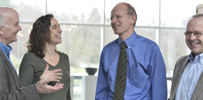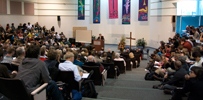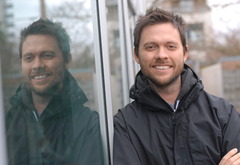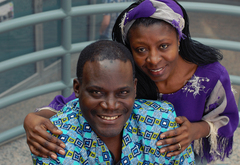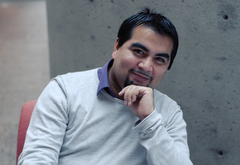Choose a concentration that interests you and pursue an area of theology that brings you life.
If you enroll in the Master of Arts in Theological Studies program or Master of Divinity program, you can focus your studies in one of several unique concentrations.
Study Christianity and the Arts and discover a theology of art and beauty, finishing your program with a creative project in the arts. Deepen your sense of vocation with a concentration in Marketplace Theology and bring theological insight to your professional calling. Dive into Scripture and hone your biblical languages with an Old or New Testament Studies concentration—and there’s so much more to explore!
Browse all our concentrations below, and find one that aligns with you and your passions.
Note that concentrations are not part of the Graduate Diploma in Christian Studies, the Master of Arts in Christian Studies, the Master of Theology, or the Master of Arts in Leadership, Theology, and Society program.
Scripture
Biblical Languages
The Biblical Languages concentration focuses on both Old Testament Hebrew and New Testament Greek, and attempts to give you a solid base of knowledge and competence in these areas. It is particularly suitable for those who intend to pursue doctoral studies in the Bible, or who desire to teach biblical languages. In this concentration, two years of both languages are required, and language study at the advanced level or within the context of advanced exegetical courses is recommended. Although a firm grasp of both Hebrew and Greek is required, you will choose one language to be your major focus and the other language to be your minor focus. You will take an Advanced Reading course in your major language (which will substitute for a seminar in this concentration) and will have additional readings in your major language in preparation for the comprehensive exam.
Required courses include:
- Hebrew (LANG 510, LANG 511, LANG 610, LANG 611, LANG 721)
- Greek (LANG 550, LANG 551, LANG 650, LANG 651, LANG 720)
Click here for details of the Biblical Languages Concentration .
Old Testament
In relating the story of God and his chosen people, Israel, the Old Testament lays the foundation for the faith of Christians. The Old Testament concentration leads you to explore, through these ancient writings, the character of God, his commitment to restore his people and all of creation, and both positive and negative human responses to God’s grace. Complemented by elective courses in other disciplines, this concentration encourages you to draw on the rich resources of the Old Testament in expressing your Christian faith, in addition to providing a firm foundation for advanced studies in Old Testament.
Required courses include:
- Biblical Hermeneutics and Criticism (BIBL 600)
- Advanced Old Testament Exegesis (BIBL 701)
- Hebrew (LANG 510, LANG 511, LANG 610, LANG 611)
Sample electives include:
- The Book of Exodus (BIBL 520)
- The Book of Joshua (BIBL 516)
- Ruth and Esther: God's Care in Times of Chaos (BIBL 521)
- The Book of Isaiah (BIBL 628)
- The Book of Job (BIBL 623)
Click here for details of the Old Testament Concentration .
New Testament
In relating the story of Jesus Christ, and in reflecting on what God was doing through Jesus, the New Testament brings the story of the Old Testament to a climax. The New Testament concentration leads you to explore the significance of the ministry, death, and resurrection of Jesus Christ within the context of restoring his people and all of creation. Complemented by elective courses in other disciplines, this concentration encourages you to draw on the rich resources of the New Testament in expressing your Christian faith, in addition to providing a firm foundation for advanced studies in New Testament.
Required courses include:
- Biblical Hermeneutics and Criticism (BIBL 600)
- Advanced New Testament Exegesis (BIBL 702)
- Greek (LANG 550, LANG 551, LANG 650, LANG 651)
Sample electives include:
- The Gospel of Mark (BIBL 652)
- Philippians: Finding Joyful Unity in Fragmented Community (BIBL 565)
- A Narrative Approach to the Gospels and Acts (BIBL 506)
- The Sermon on the Mount (BIBL 528)
- Revelation (BIBL 579)
- Colossians and Philemon (BIBL 664)
- The Gospel of Matthew (BIBL 651)
Click here for details of the New Testament Concentration .
Biblical Studies (only for MA in Theo. Studies)
A concentration in Biblical Studies is available for students in the MA in Theo. Studies program (formerly the MCS) who want to develop a biblical perspective that involves both the Old and the New Testament. This is a combination of the two previous concentrations, culminating in both an Old and a New Testament comprehensive exam (no thesis option). If you plan to proceed to advanced study in either Testament, however, you are advised that additional language study will likely be necessary beyond what is required for this concentration.
Required courses include:
- Advanced Old Testament Exegesis (BIBL 701)
- Advanced New Testament Exegesis (BIBL 702)
- Hebrew (LANG 510, LANG 511)
- Greek (LANG 550, LANG 551)
- Biblical Hermeneutics and Criticism (BIBL 600)
See the Old Testament and New Testament headings above for sample electives and upcoming offerings.
Click here for details of the Biblical Studies Concentration .
Christian History and Theology
History of Christianity
The study of Christian history is an integral aspect of our identity as Christians. In a postmodern culture that disdains the past, appreciation of our roots becomes all the more important in Christian self-understanding. The Church History concentration leads you to explore the significance of key people, events, and movements in the continuing story of God’s people—the church of Jesus Christ. In addition to basic courses that survey the history of the church, you will also have the opportunity to focus in depth on the life of the church during specific eras.
Required courses include:
- History of Christianity I (HIST 501)
- History of Christianity II (HIST 502)
Sample electives include:
- The Christian Spirit (HIST 500)
- After Acts: Patristics from the Apostles to Nicaea (HIST 542)
- The History of Religion in America (HIST 547)
- The Early Church in Africa and Asia (HIST 524)
- The History of Christianity in Asia (HIST 505)
- Women's Theological Writing (HIST 682)
Click here for details of the History of Christianity Concentration .
Doctrinal Theology
Theology is the discipline in which we integrate various resources of God’s revelation and human inquiry into as clear an understanding as we can reach of God and his world. Theology is thus the web by which we connect all our thinking as Christians, even as it serves the larger and higher purpose of loving God and serving the world he loves. The Theology concentration gives you the opportunity to explore both broadly and in depth the doctrines of the Christian faith.
Required courses include:
- History of Christian Doctrine (THEO 608)
- Perspectives on Biblical Languages(LANG 500)
- Greek (LANG 550, LANG 551) or Hebrew (LANG 510, LANG 511)
- Theology I & II (THEO 602) (THEO 601)
Sample electives include:
- After Acts: Patristics from the Apostles to Nicaea (THEO 542)
- Palestinian Theology in Context (THEO 565)
- Anglican History & Theology (THEO 650)
- Sanctification, Spiritual Formation, & Personal Transformation (THEO 613)
- Participation in God (THEO 631)
- Not Yet in the Now: Waiting for the Apocalypse (THEO 574)
- The History of Heresy (THEO 511)
- Visual Art as Theology (THEO 550)
Click here for details of the Doctrinal Theology Concentration .
Spiritual Theology
In the Spiritual Theology concentration, you explore the relationship of your life in the world with your real life in God. In contrast to the humanistic search for personal transcendence that passes for “spirituality” today, Christian spirituality is theological: it is founded on and inspired by the triune God revealed in Scripture and in Christ; it cultivates responsiveness to the seeking Father; it fully engages the mind, heart, and body; it is, as William Perkins once said, “the science of living blessedly forever.” But it is not only a personal quest; spiritual theology involves active engagement with the world and the needs of others through mission, work, ministry, and prayer.
Required courses include:
- The Christian Spirit (SPIR 500)
- Classics of Christian Spirituality I or II (SPIR 670 or SPIR 672)
- History of Christianity I (HIST 501)
- History of Christianity II (HIST 502)
Sample electives include:
- Spiritual Disciplines in the Company of Others (SPIR 523)
- Spiritual Friendship (SPIR 587)
- The Arts, Empathy, and Spiritual Formation (SPIR 536)
- John Bunyan and the Writing of Spiritual Pilgrimage (SPIR 514)
- Five Traditions and Practices of Prayer (SPIR 561)
- Spiritual Practice (SPIR 586)
Click here for details of the Spiritual Theology Concentration .
Christianity, Church, and Culture
Marketplace Theology
Regent College is an international centre for vocational integration and spiritual formation. In the Marketplace Theology concentration, students focus on expressing the Christian faith within the context of the public square of ideas, values, and institutions. The field education component can be done in a local workplace or church setting. Regular faculty resources are complemented by Faculty Associates—friends of the College currently serving in various societal careers who assist faculty and students in working on integrational issues. This concentration includes an eight-month field education experience, normally beginning in September and ending in April.
Required courses include:
- God at Work: Introducing Marketplace Theology (MARK 501)
- Marketplace Field Immersion (MARK 692)
Sample electives include:
- The Bible and Work: Going Deeper and Broader (MARK 562)
- Working Blessedly: The Shape of Marketplace Theology (MARK 540)
- Effective Organizations (MARK 559)
- Vocation, Work & Career (MARK 505)
- The Soul of Leadership (MARK 560)
Click here for details of the Marketplace Theology Concentration .
Interdisciplinary Studies
The mission of Regent College involves the recognition that God calls his people to claim the whole of human life for Jesus Christ. The Interdisciplinary Studies concentration fosters this by learning to think Christianly in the context of exploring topics that normally lie outside the theological curriculum. In Interdisciplinary Studies courses, you are challenged to reflect, from a Christian perspective, on topics such as philosophy, politics, economics, psychology, art, literature, and more. You have the opportunity to explore a wide range of such topics in your concentration, or to delve deeper in one area.
Courses starting with ARTS, INDS, and MARK count towards Interdisciplinary Studies electives.
Required courses include:
- Christian Faith and Practice in a (Post)Modern World (INDS 581)
Sample electives include:
- After Disenchantment (INDS 534)
- Smartphones, Surveillance, and Human Flourishing (INDS 521)
- Healthcare and the Christian Life (INDS 551)
- The Christian and Modern Technology (INDS 588)
- Cultural Hermeneutics (INDS 611)
- Food: Creation, Community, and Communion (INDS 535)
- Technology, Wilderness & Creation (INDS 525)
Click here for details of the Interdisciplinary Studies Concentration .
Christianity and the Arts
Regent College recognizes the importance of the arts as an expression of human creativity. The Christianity and the Arts concentration offers you the opportunity to integrate various forms of art with the Christian faith. Building on a foundational course in aesthetics (The Christian Imagination [ARTS 501]), you can choose from a diverse selection of courses in literature, poetry, music, graphic arts, and dance.
The course mixture is further enriched by Regent’s own Lookout Gallery, by performance space both in Regent’s main auditorium and atrium, and by the presence of many Christian artists in Vancouver who are associated with Regent College (e.g., Pacific Theatre). Regent can also assist you in seeking a mentored relationship with a local artist, playwright, or musician.
Click here to view requirements for the Christianity and the Arts Concentration .
World Christianity
This concentration focuses on the emerging field of World Christianity, which seeks to understand Christian thought and practice around the globe through integrated studies in history, theology and mission.
Students will gain deeper understanding of the changing face of global Christianity and its implications for the ongoing development of Christian tradition worldwide. They will cultivate familiarity with selected regional studies of Christianity, particularly those in the Majority World where the gospel is expanding most rapidly (e.g., Africa, Asia, and Latin America) as well as those among marginalized peoples of North America (e.g., First Nations and Native Americans, African Americans, Hispanics and other immigrant populations). They will also develop further competence in key issues such as gospel and culture, indigenous expressions of Christianity, globalization, inter-faith relations, renewal movements, and current trends in global theology and mission.
Through concentrated studies in this field, students will become equipped as scholars and practitioners of the Christian faith in its local and global expressions. The program is applicable for those who anticipate teaching, further research, or leadership in various capacities within the broad sphere of world mission.
Required courses include:
- Introduction to World Christianity (WRLD 501)
- Missional Church (APPL 581)
- History of Christianity I (HIST 501)
- History of Christianity II (HIST 502)
Sample electives include:
- Postcolonial Theology (WRLD 526)
- Chinese Christian Thought (WRLD 519)
- Welcoming the Stranger: Refugees in Christian Perspective (WRLD 546)
- Race, Racism, and Christian Identity (WRLD 528)
- The Stories of Christianity in Africa (WRLD 510)
- Contextualization of Christianity in China (Mandarin language only) (WRLD 543)
Click here for details of the World Christianity Concentration .
Applied Theology (only for MA in Theo. Studies, formerly MCS) and Pastoral Ministry (only for MDiv)
At Regent, we recognize the importance of assimilating Scripture, theology, and languages into the Christian lifestyle. The Applied Theology concentration and Pastoral Ministry concentration are concerned with the personal application of faith as lived experience. Under the guidance of faculty members who have spent significant portions of their lives immersed in the practice of ministry, these concentrations provide opportunity for the integration of theory and practice relevant to Christian service in the church, parachurch, mission, or society at large. The concentrations include an eight-month field education experience, normally beginning in September and ending in April.
Courses starting with APPL, MARK, and WRLD count towards Applied Theology electives.
Required courses include:
- Missional Church (APPL 581)
- Soul of Ministry (APPL 500)
- Supervised Ministry (APPL 693 or APPL 694) or Marketplace Theology Field Immersion (APPL 692) or World Christianity Field Immersion (WRLD 690) or Marketplace Immersion (MARK 692).
Sample electives include:
- Learning & the Art of Teaching (APPL 570)
- Worship in Polyrhythm (APPL 612543
- Culture, Faith, and Mental Health (APPL 579)
- Anglican Polity & Liturgy (APPL 651)
- Calling, Context, and the Church: From Belonging to Witness (APPL 529)
- When Christians Disagree: Church Unity in an Age of Divinity (APPL 578)
- Discipleship in a Digital Age (APPL 519)
Click here for details of the Applied Theology Concentration .
Chaplaincy (MDiv students only)
Go places and make a meaningful difference with a career in spiritual care. Offered in partnership with local health authorities, a concentration in Chaplaincy will support and prepare you for a meaningful life as a spiritual care practitioner.
The Chaplaincy concentration integrates Clinical Pastoral Education (CPE) training with our Masters in Divinity program, and helps students start the journey towards a professional spiritual care career in a variety of fields: healthcare, corrections, military, education, shelters, marketplace, and more.
To learn more about the unique requirements of this concentration, visit our Chaplaincy Concentration page.


